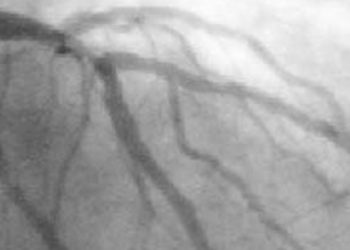Middle meningeal artery embolization reduces adverse events in patients with subdural hematomas
1. In this randomized controlled trial, among patients with symptomatic nonacute subdural hematoma, embolization of the middle meningeal artery (MMA) resulted in similar rates of symptomatic recurrence or progression to usual care.
2. MMA embolization was associated with a significantly lower incidence of adverse events compared to usual care.
Evidence Rating Level: 1 (Excellent)
Study Rundown: Chronic subdural hematoma is an increasingly common neurologic disorder in older persons due to the long-term use of anticoagulants. Symptomatic hematomas are treated first-line with surgical evacuation, typically burr-hole drainage, and support care. The risk of recurrence and progression remains steady, postulated to be a result of fragile underlying vasculature originating from the MMA. Therefore, MMA embolization has emerged as a potential therapy, but evidence for its benefits is limited. This study investigated the effect of MMA embolization in patients with symptomatic nonacute subdural hematoma. In addition to surgeon-designated burr-hole drainage or nonsurgical management, patients were randomized to undergo MMA embolization or usual care. The embolization group had similar incidences of recurrence or progression of the hematoma within 90 days to the usual-care group but saw fewer serious adverse events, including death. The study was limited in that the majority of patients underwent burr-hole drainage and there was no standardized protocol for hematoma imaging classification and embolization timing. It demonstrated no effect on hematoma recurrence and progression by embolizing the MMA, although it could lower the risk of serious adverse events.
Click here to read the study in NEJM
In-Depth [randomized controlled trial]: This was an open-label, randomized trial to assess the impact of MMA embolization in patients with symptomatic nonacute subdural hematoma. Patients 18 years of age or older with nonacute subdural hematoma causing mass effect, who were previously functionally independent (score of 0-2 on the modified Rankin scale), were eligible for inclusion. Exclusion criteria included bilateral subdural hematoma with an unknown source of symptoms and indication for craniotomy or emergency surgical evacuation. In total, 722 patients were then randomized 1:1 to undergo MMA embolization or receive usual care. The primary outcome was symptomatic recurrence (including headache, cognitive impairment, dysarthria, ataxia, altered sensorium, and seizure; with maximum hematoma thickness exceeding 10mm or repeat burr-hole drainage) or progression (defined as an increase in maximum thickness by more than 3mm or indication for surgical rescue) of the hematoma within 90 days from randomization. Overall, 78.3% of enrolled patients underwent burr-hole drainage. Among 274 patients who underwent both drainage and embolization, 99.6% (273) had drainage performed after embolization. The primary outcome occurred in 24 patients (6.7%) in the embolization group and 36 (9.9%) in the usual-care group (difference, -3.3 percentage points; 95% Confidence Interval [CI], -7.4-0.8; p=0.10). There were also no significant differences in secondary outcomes between the two groups. Most safety outcomes were also comparable between the two groups, including burr-hole surgery-related complications and adverse events of special interest (including asymptomatic intracranial hemorrhage, infection, adverse drug reaction, epilepsy, and stroke). However, the embolization group had a significantly lower incidence of serious adverse events, including death, within 90 days (6.7%) compared to the usual-care group (11.6%) (relatively risk 0.58, 95% CI 0.34-0.98). In summary, these findings prompted further investigation to elucidate the efficacy of embolization in treating nonacute subdural hematoma.
Image: PD
©2024 2 Minute Medicine, Inc. All rights reserved. No works may be reproduced without expressed written consent from 2 Minute Medicine, Inc. Inquire about licensing here. No article should be construed as medical advice and is not intended as such by the authors or by 2 Minute Medicine, Inc.







